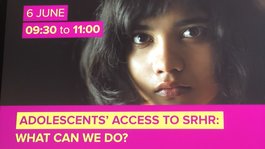
With a High-Level Panel on the European Development Days, Belgium raised attention for the unmet needs of adolescents.
June 6, Brussels. "Unsafe abortion is more accessible then contraceptives”, Young EDD leader Archane Phonsina said, in her testimony of young women’s challenges in the DR Congo. Phonsina lost one of her best friends to an unsafe abortion and is one of the leading voices for adolescents’ access to family planning and safe abortion in her country. “Simply speaking about family planning is still stigmatised and many girls will have at least two unsafe abortions in their lifetime”, she explained.
June 6, Brussels. "Unsafe abortion is more accessible then contraceptives”, Young EDD leader Archane Phonsina said, in her testimony of young women’s challenges in the DR Congo. Phonsina lost one of her best friends to an unsafe abortion and is one of the leading voices for adolescents’ access to family planning and safe abortion in her country. “Simply speaking about family planning is still stigmatised and many girls will have at least two unsafe abortions in their lifetime”, she explained.
The difficulties faced by Phonsina and her peers are no standalone case. Burkine adolescents are facing the very same problems as young women in the DRC, Burkina Faso’s Minister of Health Nicolas Meda confirmed. 65% of the country’s population is younger than 25 and their access to information and SRH services remains heavily restricted. While taboos rest on discussing SRHR and menstruation, the health system is weak and only a handful of health centres provide youth-friendly services.
Ian Askew, Director of the WHO Department of Reproductive Health and Research explained that while adolescents need pretty much the same services as adults, they face numerous barriers to access those services. Centres might be far off and likely to be open at a time when adolescents are at school. Services might be costly too. And then there’s the social-political environment in which sexual and reproductive health services operate, which determines if adolescents are welcome or not.
Belgium’s Deputy Prime Minister and Minister of Development Cooperation, Alexander De Croo, admitted to the huge funding gap towards SRHR, pointing out how the Global Gag Rule cut the funds of organisations that were doing great work on the ground. “It is not all about money, but it is still about money”, he said. “Money is a key element of the discussion”. He also underlined the importance of national political and local religious leaders speaking out in support of SRHR, and the importance of engaging in a dialogue on family planning with (local) leaders.
European Commission’s Deputy Director-General for International Cooperation and Development, Marjeta Jager, shared the concerns regarding the SRHR funding gap and confirmed that the European Commission remains committed to ensuring women’s and girls’ access to SRHR. Jager pointed out the EC spent €470 million on reproductive, maternal, neonatal and child health in 2017.
The High-Level Panel was co-organised by the Belgian Development cooperation and Be-cause Health, the Belgian platform for international health of which Sensoa is an active member.
Watch the penal debate
Check out other EDD2018 highlights
Ian Askew, Director of the WHO Department of Reproductive Health and Research explained that while adolescents need pretty much the same services as adults, they face numerous barriers to access those services. Centres might be far off and likely to be open at a time when adolescents are at school. Services might be costly too. And then there’s the social-political environment in which sexual and reproductive health services operate, which determines if adolescents are welcome or not.
Belgium’s Deputy Prime Minister and Minister of Development Cooperation, Alexander De Croo, admitted to the huge funding gap towards SRHR, pointing out how the Global Gag Rule cut the funds of organisations that were doing great work on the ground. “It is not all about money, but it is still about money”, he said. “Money is a key element of the discussion”. He also underlined the importance of national political and local religious leaders speaking out in support of SRHR, and the importance of engaging in a dialogue on family planning with (local) leaders.
European Commission’s Deputy Director-General for International Cooperation and Development, Marjeta Jager, shared the concerns regarding the SRHR funding gap and confirmed that the European Commission remains committed to ensuring women’s and girls’ access to SRHR. Jager pointed out the EC spent €470 million on reproductive, maternal, neonatal and child health in 2017.
The High-Level Panel was co-organised by the Belgian Development cooperation and Be-cause Health, the Belgian platform for international health of which Sensoa is an active member.
Watch the penal debate
Check out other EDD2018 highlights

 RSS Feed
RSS Feed